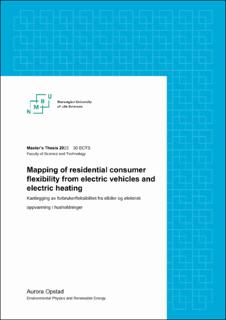| dc.description.abstract | In combination with an increasing consumption, due to electrification, the green shift challenges the power grid. When regulative energy production is substituted with production from uncontrollable sources, the need for a flexible consumption increases. This can originate from shifting or decreasing household consumption.
This thesis investigates the flexibility of residential electrical vehicle (EV) charging and electric heating. In addition, this thesis aims to research the potential benefits and challenges related to smart charging and will examine how temperature and other factors affect the availability of flexibility. The two data sets that have been used provide real consumption from 1140 and 2043 households and include information regarding EV chargers and heating source respectively. The data spans from November/December 2020 through March 2021. Firstly, coincidence factors (CFs) for residential EV charging, with and without smart charging, have been quantified. The CF represents the concurrent home charging. Secondly, charging session duration and delivered energy have been calculated and used to further discuss the availability of flexibility. Lastly, the flexibility of electric heating has been examined by comparing mean consumption profiles for groups of households with and without electric heating.
\\
\\
The results from real charging behavior indicate that households with smart charging have a significantly higher consumption during the night. The CF for smart charging vehicles is quantified to a maximum of over 30\% and 10\% for smart and normal charging respectively. These results coincide with other research. EVs with smart charging will have their charging allocated to hours of low electricity price. Smart charging will cause the EV charging to synchronize, resulting in a high CF. This can possibly create issues in the low-voltage grid. The CFs have a negative correlation with temperature meaning the EVs charge more frequently in colder weather.
The analysis of charging sessions shows a mean duration of around $4.7$ hours independent of being smart or normal. The mean delivered energy is calculated to around $23 kWh$ for both smart and normal charging. The difference between the time the EV needs to reach the desired battery level and the time it is connected to a charger is considered to be its flexible window. The combination of the CF and charging session duration and energy can be used to further estimate the flexibility potential of EVs.
The available flexibility from space and water heating has been studied by categorizing real consumer data based on heating sources. Four groups consisting of households with electric water heating, shared water heating, electric space heating, and district space heating were established. The average normalized consumption of the groups shows a significant difference in the morning hours. This implies that some electric heating is in use during the morning hours, consequently revealing a potential for flexibility. The groups without electric water and space heating have a lower consumption. At last, the consumption is negatively correlated with temperature meaning the potential for flexibility from electric heating is increasing with decreasing temperatures and vice versa.
Further research on CFs and charging sessions can benefit the prediction of demand from EVs. This is likely going to be important for the planning of grid investments, especially in the low voltage grid. Lastly more research on charging behavior, CFs and electric heating would likely be beneficial for prediction of flexibility volumes. This would be of interest to aggregators and TSOs. | |
